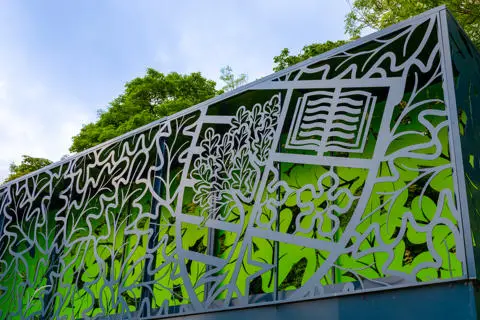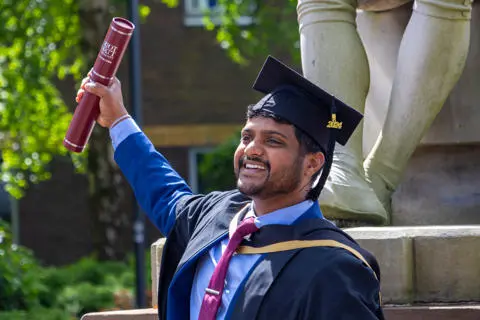Key information
This taught postgraduate programme in Advanced Concrete Technology is designed to provide professionals already working in the concrete industry as well as those seeking to enter the field with a thorough understanding of Advanced Concrete Technology and its application in construction.
- Level
- Postgraduate
- Delivery type
- Self-paced
- Degree qualification
- MSc
- Location
- Online
- Duration
- Varied
- Start date
- September, January
Programme overview
Participants will gain insights into the fundamental principles required to design and construct high-quality, durable, and sustainable concrete structures. It also covers the management of concrete performance in service and introduces the concept of life cycle analysis as a means of reducing carbon footprint and improving whole-life cost efficiency.
The programme is tailored for construction professionals currently involved in the production, application, and quality control of concrete, as well as those engaged in educational activities related to concrete construction. It is also well suited to recent graduates looking to specialise in concrete technology and construction.
Degree duration
The fastest this postgraduate programme can be completed is in 2 years. The maximum completion timeframe is 8 years. On average, most students complete an MSc in 3 years.
Delivery on Online degrees
Our up-to-date and progressive course materials are made available online through the Virtual Learning Environment (VLE). The VLE links you with our expert academics and course materials through videos, webinars, articles, journals, assessments and discussion boards. Tutors will provide you guidance by email or live discussion.
To find out more about time requirements, support and exams, view our how online learning works pages to find out more.
Industry links
The courses within this programme are structured around comprehensive learning objectives developed by the Technical and Education Committee of the Institute of Concrete Technology (ICT). These objectives are regularly reviewed and updated to reflect current industry developments and demands. Further, a representative of the ICT Examinations Committee will validate the assessment quality and content on a yearly basis, to validate the programme for the ICT’s professional qualification, enabling UK-based graduates to seek professional qualification (IEng or CEng) of the Engineering Council.
This programme also benefits from the support of the Civil Engineering Strategic Advisory Board, which includes representatives from leading multi-national firms, such as AECOM , Arup, Atkins, Balfour Beatty, Halcrow, Jacobs and WSP Group. This Board convenes regularly to provide general guidance to the academic team on the course content and connecting with relevant industrial partners.
Contact our enquiries team
Read moreCourse content
This taught postgraduate programme in Advanced Concrete Technology comprises 180 credits in total, divided into 2 groups of 3 taught courses (120 credits in total) and an independent research dissertation (60 credits).
Group 1 courses
- Constituent Materials of Concrete
- Early-age Properties of Concrete
- Long-term Performance of Concrete
Group 2 courses
- Testing and Quality Assurance of Concrete
- Service life, Repair and Maintenance of Concrete Structures
- Concrete Production, Processes, Applications and Construction Practice
Students are required to follow the recommended sequence of study, i.e., starting with the Constituent Materials of Concrete course and completing all Group 1 courses before progressing to Group 2. A maximum of 2 courses may be taken per semester, and assessments must be completed within the same semester in which the course is registered.
At the start of the programme, students are invited to attend an induction event, lasting three working days. Whilst in-person attendance is not compulsory due to the international nature of the cohort, it is strongly encouraged. Recordings will be available for those unable to attend. The induction provides an opportunity to meet fellow students and academic staff, gain an overview of the course structure and assessment methods, and understand what is expected of part-time learners. You will also hear from students who have completed the taught component and meet representatives from the Institute of Concrete Technology, who will explain how the programme aligns with the requirements for professional qualifications. The content of each course will be introduced to you through a set of pre-recorded introductory lectures. This will be followed by one group assignment and two individual assignments for you to learn the course content and apply the knowledge thus obtained to develop your practical knowledge related to topics covered in the course.
The dissertation may be undertaken at any Heriot-Watt University campus (in Edinburgh, Dubai, or Malaysia) or at an approved independent organisation, with both a local supervisor and an academic supervisor from Heriot-Watt University. To progress to the dissertation, students must achieve an average mark of at least 50 across the taught courses, with no individual course mark below 40.
The Postgraduate Certificate is awarded to those who successfully complete each of the two groups of courses, the Postgraduate Diploma is awarded after the successful completion of both groups of taught courses, and the MSc is awarded after the successful completion of the two groups of taught courses and an independent research dissertation. Those who complete both the Postgraduate Diploma and Postgraduate Degree (MSc) are eligible to apply for the professional membership of the ICT.
Fees and funding
| Per course | Dissertation |
|---|---|
| £1,955 | £2,030 |
The tuition fees listed are applicable for 2026. Fees normally increase annually.
Tuition fee loans are available to Scottish distance learning students on some taught postgraduate courses. Find out more from the Students Awards Agency Scotland (SAAS).
Funding opportunities
Scholarships and bursaries
We aim to encourage well-qualified, ambitious students to study with us and we offer a wide variety of scholarships and bursaries to achieve this. Each year, hundreds of students enhance their educational experience through a variety of Heriot-Watt and externally funded scholarships, including opportunities funded by the University's generous alumni community, based all over the world.
View our full range of postgraduate scholarships.
Entry requirements
We have standard entry requirements for all of our courses that you will have to meet.
Standard entry requirements
Applicants must meet one of the following criteria:
- A minimum of a 2:2 honours degree or equivalent qualification in a relevant engineering discipline, with adequate knowledge of materials chemistry
- An approved certification in Advanced Concrete Technology, such as the ICT Certificate in Concrete Technology and Construction
Applicants with substantial relevant professional experience, such as over 20 years in the concrete industry, including at least 5 years in a senior managerial role overseeing the production of concrete and concrete products and/or the construction of concrete infrastructure, may also be considered, where the above academic routes are not applicable.
Each application, on the basis of a 1500 word description of the experience of the applicant, will be assessed by a HWU academic course tutor and a representative of the ICT Technical and Education Committee, and together they will make the recommendation to the University on the eligibility of the applicant.
January or September entry
Students can choose to start their studies in January or September.
Recognition of Prior Learning
We are committed to providing study opportunities to applicants who have a wide range of prior experiences through Recognition of Prior Learning (RPL). For more information on RPL, please contact the Online Admissions Team (egis-idl-apps@hw.ac.uk) ahead of application. We can only consider requests for RPL at the time of application to a course of study.
English language requirements
If your first language is not English, or your first degree was not taught in English, we'll need to see evidence of your English language ability.
The minimum English language requirement for entry to this programme is IELTS 6.0 (or equivalent) with no score lower than 5.5.
If you do not have IELTS 6.0, we offer a range of English language courses to help you meet the English language requirement for this programme prior to commencing your studies.
Why Heriot-Watt
We're the top university in Scotland for graduate outcomes and 5th in the UK, which means that more of our graduates are employed or in postgraduate education than any other institution in the country. We're also ranked 1st in Scotland for producing CEO and MDs (Novuna Business Cash Flow 2023).
We're Scotland's most international University, with five global campuses and a global community of 60,000 online students and alumni from over 158 countries. Our online programmes are designed and developed by the same faculty who teach on our global campuses - expert academics and leaders in research and innovation who work alongside industry to find solutions to some of the world's most pressing challenges.
Together, we shape your future.
Your Online experience
Explore Heriot-Watt Online as a student






